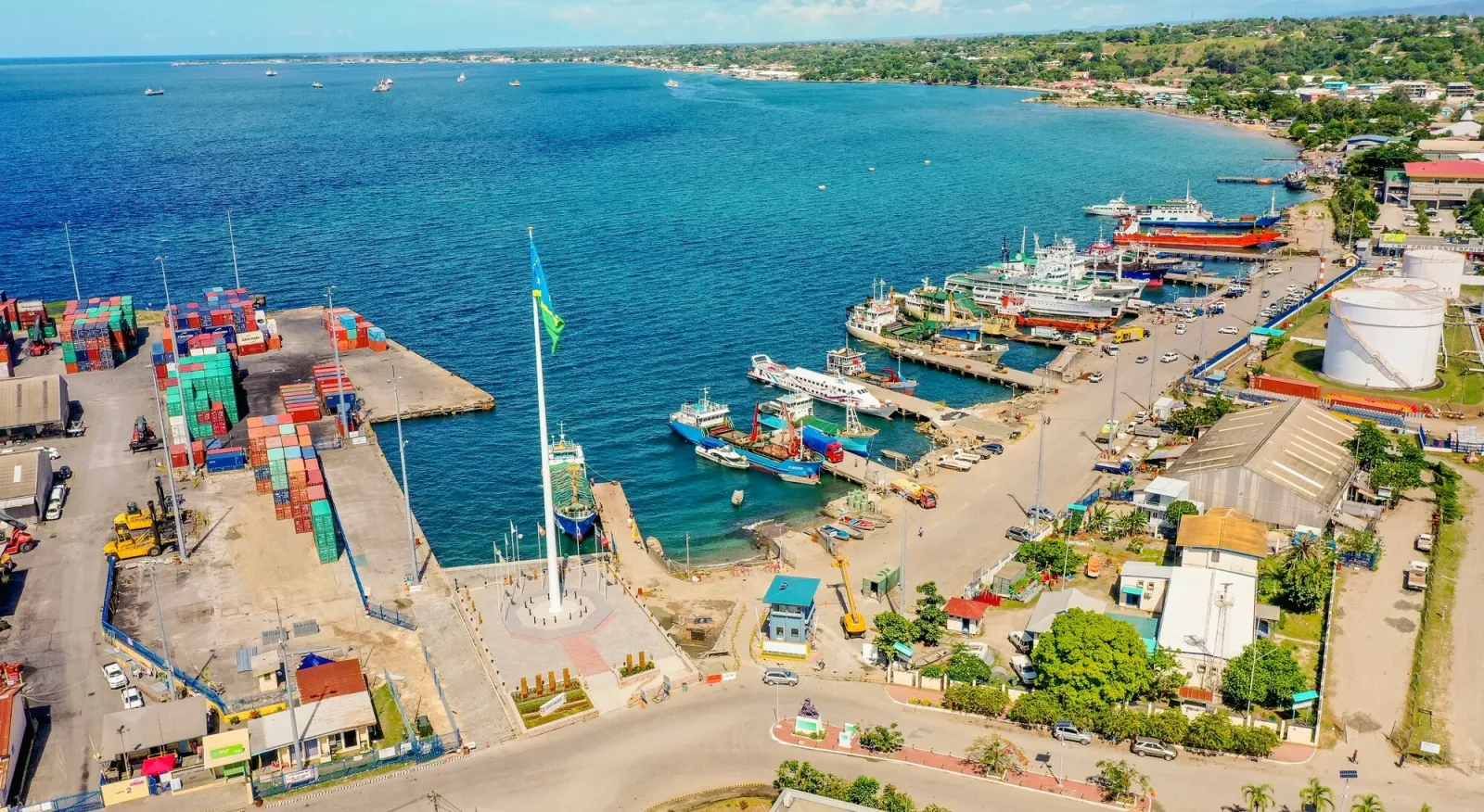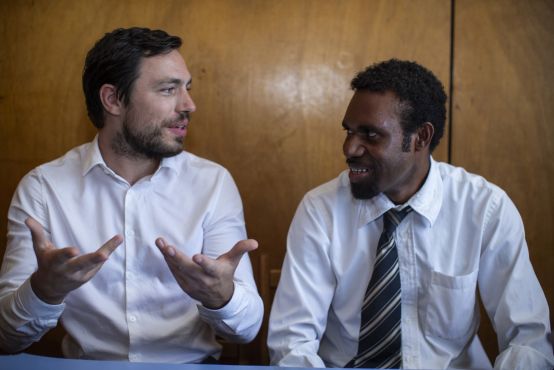
About Solomon Islands
Just three hours north-east of Brisbane, Solomon Islands is a fascinating country with more than 70 living languages and incredible marine and terrestrial biodiversity.
The third largest archipelago in the South Pacific, Solomon Islands comprises 992 islands, with its islands grouped into nine provinces. The capital, Honiara, is located on Guadalcanal, the largest island. Solomon Islands became an independent country in 1978, having previously been under British colonial rule from the 1890s.
A number of key battles in the Pacific theatre of World War II took place in Solomon Islands, and the country continues to deal with the legacy of unexploded WWII Ordnance. Solomon Islands is a parliamentary democracy with both national and provincial levels of government. While the population of the capital Honiara is steadily growing, almost three-quarters of the country’s population live in rural areas, with most rurally based people making a living from subsistence farming and fishing.
Like other small island developing states, Solomon Islands faces a number of development challenges due to climate change, limited opportunities for economic growth, and the challenges of service delivery to remote and geographically dispersed populations
Solomon Islands is known for its people being warm and friendly, as well as for holding a strong cultural identity.
Australian volunteers have supported a wide range of Solomon Islands partner organisations to achieve their development goals since 1965.
Learn more about the Australian Volunteer Program's work in Solomon Islands.
Key things to consider about volunteering in Solomon Islands
- Solomon Islands has a very outdoors way of life, this lifestyles suits volunteers who enjoy hiking and going to the beach.
- High cost of living with increased costs of service delivery due to a small and geographically dispersed population. Country-specific allowances are designed to reflect this.
- Mobile and internet services can be limited in some areas of the Solomon Islands. Have a backup communications plan.
- Men and women tend to socialise within same-sex groups, and only occasionally will you find that women and men socialise together. Having a lone male or female visit you in your home alone may be misunderstood.
- Solomon Islands time: Approaches to time and timing are different to that in Australia. Service delivery and the pace of office life is likely to be slower than that experienced in Australia.
Volunteer Spotlight
Australian volunteer Jake and his colleague Daniel share what it's like to work together on a volunteer assignment in the Public Solicitor Office in Solomon Islands.

Culture and religion
Understanding culture is an important part of integrating into the community in Solomon Islands. Culture and tradition are very important to the people of Solomon Islands. Establishing respectful relationships is fundamental to volunteers’ effective integration into the community.
Art, storytelling, and music play a vital part in sharing Solomon Island’s culture. Volunteers can experience this across all the islands, from body decorations and tattoos to hand carvings, costumes and headwear.
Solomon Islands has a strong culture which may seem to favour men over women. This comes from the belief that women’s and children’s safety is in the hands of the husband and fathers.
Religion
Christianity is the predominant religion in Solomon Islands, with ninety-five per cent of the population identifying as Christian.
The churches play a very strong role in communal life, especially in rural areas. Virtually every village has a church building or leader, and prayer or church services are held once or twice a day.
Dress
Local work attire is simple and modest in Solomon Islands because of the tropical weather. For women, a skirt and blouse or a long dress are acceptable. For men, long trousers and long or short sleeved shirts are common dress. Suits are generally only required for the most formal of occasions.
Language
English is the official language, but Solomon Islands pijin is the most widely spoken language.
There are more than 80 different local languages in Solomon Islands, plus dialects. Everyday conversations at work are in pijin, so it is important for volunteers to learn some pijin language.
The program provides funding to support language lessons. More information on this process will be available during the onboarding process.
Explore our Pride Guides
LGBTQIA+ program participants must be aware of the country's context before undertaking an assignment. Pride Guides are designed to introduce key issues related to people with diverse SOGISEC & their participation in the program.
Learn more
Day to Day Life
Climate
The climate is tropical, though temperatures are rarely extreme due to cooling winds blowing off the surrounding seas. Day time temperatures normally range from 23 to 31 degrees.
There are two seasons during the year: one the dry and cool (April to October), and the other the wet and warm season (November to April), which brings higher temperatures, rainfall and cyclones.
Telecommunications
Mobile services have continually expanded in the Solomon Islands. 3G services became available in 2010, leading to an increase in mobile broadband uptake. Fixed broadband services which underpin the development of a digital economy are largely limited to government, corporations, and educational organisations in the Solomon Islands.
Internet services have improved with the build-out of the Coral Sea Cable System linking Papua New Guinea to the Solomon Islands, and the connecting cable to a landing station at Sydney.
The launch of the Kacific-1 satellite in late 2019 also improved broadband satellite capacity for the region.
Mobile phone SIM cards are widely available both in Honiara and the Provincial Centers. Mobile phone coverage also decreases as you go to different remote locations across the country.
Food and dining
Traditional ingredients and recipes of Solomon Islands have been passed down by generations and have also been influenced by those who have inhabited the islands over time. There is a strong European and Asian influence, however old diet traditions are easily found. There is a diverse range of vegetables and meats used in local recipes, including taro, sugar cane, rice, papaya, yams and fresh seafood.
Honiara has a wide range of Asian and western restaurants along with local ‘kai bars’. In other parts of the country, options will be largely traditional island dishes, featuring seafood and local vegetables. While there are no dedicated vegetarian or vegan restaurants, vegetarian options are generally readily available.
Accommodation
Volunteers can find a range of accommodation types in Honiara, including houses and apartments. Accommodation will vary between the capital and provincial towns. I Prices in Honiara are high, and this is reflected in the allowances paid to volunteers. Options will be more limited in assignment locations outside of Honiara.
In-country teams will be able to provide support to locate suitable housing. It is a good idea to research where your partner organisation is located before this. Consider your mode of transportation with the location you are looking for.
Find out about our in-country allowances
Transport
Public transport is available in Honiara and Auki, running along the main road and into many residential areas. There is a domestic airline, with regular services to provincial capitals and other locations, such as Auki and Gizo. Ferries and boats are also a key form of transport between the islands.
Personal safety
When it comes to your safety and security you must be willing to adapt your behaviour and lifestyle to minimise the potential for being a target of crime. Like anywhere else in the world, crime exists in Solomon Islands.
Crime poses the main a risk to foreign visitors and expatriates and is often linked with drunkenness and drug use. Incidents of pickpocketing, bag snatching, assault, and house and vehicle break-ins are relatively common in Guadalcanal and Malaita, particularly around markets and beaches.
Solomon Islands experiences a range of natural disasters such as earthquakes, heavy rain, floods, tsunamis, droughts and cyclones.
There are a few key health considerations to keep in mind as well. National Referral Honiara hospital is the largest hospital in the Solomon Islands. During the wet seasons, there is an increase in the number of malaria and dengue cases in Honiara, Malaita, Central Islands, Guadalcanal and Temotu Provinces of the Solomon Islands. It is advisable to use a mosquito net and repellent when travelling into rural locations.
Personal safety issues constantly evolve, we recommend you keep an eye on Smart Traveller for current information.
Mobility and accessibility
Physical access for wheelchairs and other mobility aids are still emerging in Solomon Islands. There is a growing number of accommodation options and facilities which provide access for the disabled and elderly.
We’re committed to ensuring that international volunteering is inclusive and accessible to Australians from a range of backgrounds, with diverse perspectives, identities and abilities.
To support this, Access and Inclusion Plans are available for volunteers with disabilities to assess their needs and ensure their living and working requirements are fully considered. Indigenous Pathways is an Indigenous-led program that focuses on providing culturally safe, flexible and tailored support for Aboriginal and Torres Strait Islander volunteers.
Before applying for a volunteering assignment in Solomon Islands, please do some further research on living in Solomon Islands and the organisation you are hoping to volunteer with. Successful applicants will have the opportunity to discuss expected living and working arrangements with their recruitment officer.